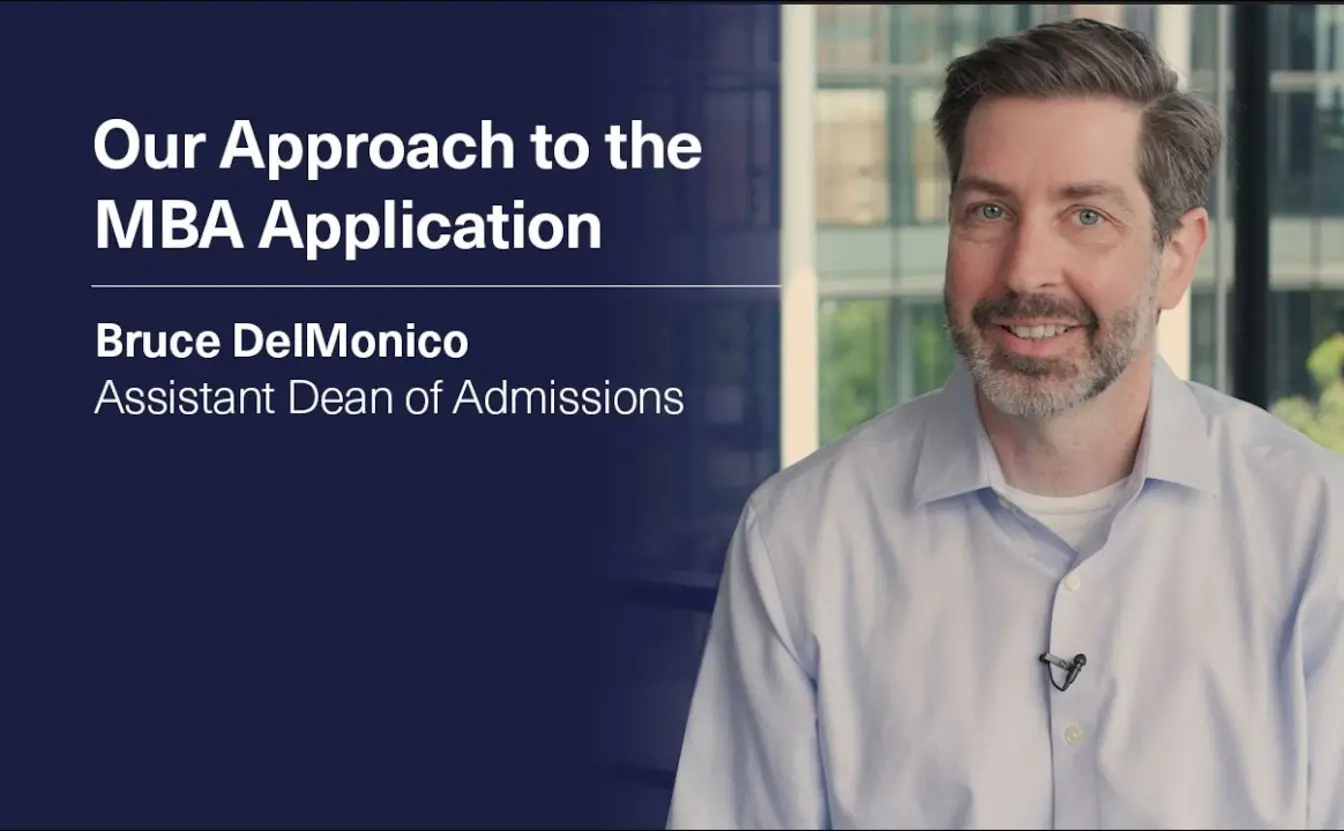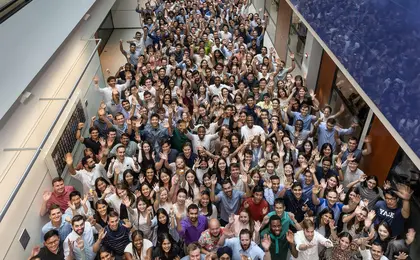Application Guide 2023-2024
Thank you for taking the first step to join the yale som community..
Applying to MBA programs can be a daunting process. There are lots of tasks to prioritize, manage, and complete, and sometimes it can feel overwhelming. Our hope is that this Application Guide will provide useful insights and advice as you prepare for your Yale SOM application. Please use this Guide as a resource to help you think through the overall application process; specific instructions for each section of the application are found in the Yale SOM application itself. Between this Guide and the application instructions, you should have everything you need to complete the Yale SOM application. Good luck!
Bruce DelMonico Assistant Dean for Admissions


How We View the Application Process
Before we dive into the Yale SOM application itself, it may help to step back and take a moment to share a little about how we as a school view the application process generally. We put a lot of thought into how our application is constructed. Our guiding principle is to be thoughtful and economical in the information we ask of you – to only ask questions that are relevant to evaluating your candidacy, while still giving you ample opportunity to share who you are and what matters to you.
We also very much subscribe to the idea of holistic review. We know that the admissions process is a partial and incomplete glimpse into who you are. No one can truly summarize themselves in such a succinct format—test scores alone don’t tell the whole story, nor do your transcript, work history, essay, recommendations, or extracurricular activities. We don’t believe that you can or should be defined by a limited set of reductive data points, which is why we look at all the information available to us across your entire application in a careful and nuanced way to get the best sense of your individual candidacy.
Finally, we work hard to make sure our application is not only thoughtful, economical, nuanced, and holistic, but also that it is structured to heighten consistency and reduce bias. You’ll notice, for example, that we limit the number of activities you can list in the Activities section of the application to two. We do this to level the playing field among applicants and limit the role “activity collecting” plays in the review process. This is one example of our attempts to create a fair and consistent application process.
We know that applying to MBA programs can be time-consuming and challenging. As you embark upon this process, we encourage you to approach it in the spirit of reflection and self-discovery, looking to know more about yourself at the end of the journey than you did when it began. This is the start of a lifelong process of personal and professional growth, and we’re excited to begin it with you!
Some Initial Considerations
We have three application deadlines (September 12, 2023; January 4, 2024; and April 9, 2024), and also accept applications through the Consortium for Graduate Study in Management and QuestBridge Graduate School Match, using their respective deadlines. So, your first question may well be: which round should I apply in?
If you were a QuestBridge Scholar in college or align with the mission of the Consortium, you may want to consider applying to us through those organizations. Regardless of whether you apply through QuestBridge, the Consortium, or directly to Yale SOM, the advice we invariably give is that you should apply when you feel you have your strongest application prepared. This means that if you need more time – for example, to take (or re-take) a standardized test, or gain more work experience, or secure your recommendations – you should take the time to do so. We model the application cycle so that the same application has a comparable chance of being admitted regardless of the round in which you apply. Obviously there can be benefits to applying early (for example, you’ll get your decision sooner), and if you’re ready to apply in time for an earlier round there’s no need to wait until a later one to do so. But don’t feel as though you need to rush to submit your application if you could make it materially stronger by taking the time to improve it in a meaningful way.
Once you’ve settled on an application round, your next question might be some variation of: OK, what’s next? Below are a few considerations to help you start to get a handle on the application process. Also, if you haven’t done so yet, consider signing up for our MBA newsletter , which includes our Inbox Application Insights – a series of application advice delivered to you as you need it in the weeks leading up to our application deadline.
1. Standardized Test – We accept both GMAT and GRE (current and future versions). Explore both options to see which is best for you, and then give yourself a few months before the application deadline for unrushed study and test-taking – you want to give yourself ample time to feel prepared, and also to be able to re-take the test before the deadline if desired.
2. Transcripts – We don’t require official academic transcripts when you apply (only if you’re admitted and enroll), so you just need to make sure you have unofficial copies of all of your undergraduate and, as relevant, graduate transcripts (including transfer credits, summer school, study abroad, and others) that you can upload to your application.
3. Recommendations – We require two professional recommendations (for current college seniors who apply through the Silver Scholars Program it’s one professional and one academic recommendation). Your recommenders are usually busy people with many competing priorities, so be sure to give them time to write your recommendation. Ideally, you should identify who you want to write your recommendations and ask them to do so at least a month before the application deadline, so that they have plenty of time to get their recommendations to us.
4. Resume – In connection with securing your recommendations, you may want to work on updating your resume with an eye toward MBA applications. Your resume is a valuable summation of your academic and professional backgrounds and achievements. You’ll want to make sure it’s updated and captures your key accomplishments, and it can be helpful to do that at the same time you’re speaking to your recommenders about their recommendations. And even though we recommend you not share any of your written application materials (such as your essays) with your recommenders, you may want to show them your resume to help remind them of those accomplishments as they write on your behalf.
5. Essay – The essay may be one of the last things you complete before submitting your application. That’s OK, but be sure to spend time thinking about what you’ll write and working through the writing process far enough in advance of the deadline that you’re not scrambling to put your ideas into words as the deadline’s approaching. This isn’t a creative writing program, so you don’t need to spend an excessive amount of time stressing over the finer points of every linguistic turn of phrase, but as with the other elements of the application, you don’t want to feel rushed.
One final question you may have as you explore your MBA options is: how can I learn more? There are lots of ways to get more information from many different sources. We’ve put together a range of resources ourselves to you to help you learn more about Yale SOM and also navigate the MBA application process. We have a host of in-person and online events , Student Ambassadors , a blog series, and even the opportunity to visit campus should you find yourself in the Northeast United States. And, as noted above, our MBA newsletter contains lots of information about the school as well as a just-in-time series of tips and advice for you as you’re preparing your MBA application. And of course, if you still have questions, you can always contact us directly.
Inside the Application Itself
Your academic record, in combination with other elements of your application, helps us understand your preparation to thrive in the MBA classroom. But you’re more than just your GPA; we seek to understand all aspects of your academic path, from the courses you took to the ways in which your performance may have changed over the trajectory of your education. Although we ask some questions to understand your exposure to quantitative coursework, we welcome students from all academic backgrounds and disciplines; quantitative coursework is not a prerequisite for the program.
At this point, unless you’re a college senior applying to our Silver Scholars Program, your academic record is likely complete and your focus now is on sharing your transcripts with us as part of your application. The application instructions have more detailed information on the process for uploading your transcripts, but it’s worth noting a few things now as you start gathering materials:
First, we don’t need your official university transcripts at this point. To apply, you can submit either a copy of a physical transcript or a comprehensive electronic transcript; we’ll require your official transcript only when you enroll.
Second, in addition to your degree-granting institution’s transcript, we require transcripts for every course you took for degree credit – study abroad, transfer credits, community college courses, summer courses, etc. – at other institutions (unless those courses and grades are reflected in your degree-granting institution’s transcript). Missing and incomplete transcripts are the number one reason for delays in application review once we begin reading your file, so it makes sense to gather together all your transcripts now to make sure they’re complete and ready to upload when you apply.
Of note, although your academic record is largely fixed by now, sometimes applicants will take a one or more quantitative courses to help demonstrate their quantitative exposure and preparation if they didn’t have those courses as an undergraduate and their test scores do not give sufficient evidence of quantitative preparation. So, for example, if you didn’t have any quantitative exposure as an undergraduate and your standardized test quantitative subsection score does not sufficiently showcase your quantitative abilities (for example, it’s outside of our mid-80% range), you may want to take statistics or microeconomics (or both) to give more confidence about your quantitative preparation for the program. (Those courses are also worth taking if you haven’t done so before, even independent of the admissions process, because they are very helpful foundations for your MBA coursework.)
As with your entire application, we are very interested in the whole picture. What was the progression? Did you have an opportunity to take courses outside of your major? Were you working a job in undergrad to pay for your education? There are so many other factors that provide context and nuance to your academic record, and we very much want to understand that contextual information as we review your academics.
—Kate Botelho, Senior Associate Director of Admissions
MBA applicants tend to put a lot of emphasis on test scores, but remember that they’re just one piece of a larger picture, and they’re used for a limited purpose: to give us some sense of your level of preparation for the core curriculum, which is all they’re validated to predict. And even for this limited purpose, they’re only one of several indicators – including your academic history and your Behavioral Assessment – that helps us determine your classroom readiness. We consider all parts of your application when considering your candidacy.
We accept both the GMAT and the GRE, including the online and newer, shorter versions of the exams. The Admissions Committee has no preference between the exams, and we’re well versed in evaluating scores from each. As you consider which one to take, it may make sense to try practice questions from each (or even an entire test!) to see which one resonates more with you. Much like the SAT and ACT for those of you who decided between those two tests when applying for college, the GMAT and GRE have some similarities and some differences, so you may feel more comfortable taking one over the other.
Once you decide which exam to take, give yourself time to study. Even in their shorter and more streamlined versions, these are exams that take time to prepare for. Usually you’ll want to spend two to three months studying and preparing, depending on the number of hours available to you each week. And you should try if possible to take the exam far enough in advance of the application deadline to be able to re-take it if necessary – it’s not uncommon for applicants to take the test more than once, although of course there’s no need to do so if you achieved a score you’re happy with on the first try! (If you do end up retaking a test after the application deadline, get your new score to us as soon as you can so that we can try to incorporate it into our review – you’ll be able to enter the new score on your applicant status page.)
In thinking about your test score and whether to re-take the exam, know that we look not just at your overall score but the subsections as well. We also consider your scores not just in isolation but in the context of your academic and professional backgrounds. In other words, a test score has no fixed weight within our application review, but is considered relative to other relevant aspects of your application in assessing your academic preparation. We don’t have any baseline or minimum scores – either for the total score or subsections – below which we won’t consider an applicant, but we do want to make sure the subsections aren’t too far out of alignment; that is, you should show some degree of competency in each subsection, even if your overall score is competitive (for example, a score in the 99th percentile in one subsection doesn’t counterbalance a score in the 9th percentile in another).
Importantly, as with your academic transcripts, you don’t need to submit official test scores when you apply to us. We accept self-reported scores when you apply and will only require official scores after you enroll.
Also, note that we do not require non-native English speakers to submit an English language test such as the TOEFL, IELTS, or PTE. One of the reasons we introduced our video questions component years ago was to eliminate the English testing requirement and make the process simpler and less expensive for applicants.
When we say we have no preference between the GMAT and GRE, we really mean it. Take whatever exam you feel most comfortable with. I also recommend being a bit strategic. If you know you’ll want to apply for a joint degree, maybe the GRE would be best for you since you can likely use that score to apply to both programs. If you’ve tried taking one of the exams a couple of times and aren’t attaining the score you’re hoping for, maybe it would be a good idea to try the other exam to see if that’s a better test for you.
—Amy Voth, Senior Associate Director of Admissions
In evaluating your candidacy for Yale SOM, we look at not just your potential to perform academically, but also your potential for professional success and impact. Your past professional experience – as evidenced through the Work Experience section of the application and your resume – is a way to highlight the positive impact you’ve had in your career so far, and in turn the likelihood that you’ll continue to have meaningful impact after Yale SOM.
Your resume is an opportunity to give us a concise overview of your professional experience, academic background, and any volunteer work, activities, or other interests that help to tell your story. Unless you have more than ten years of work experience, your resume should be limited to one page. (If you do have more than ten years of work experience, feel free to take the additional space needed to cover all of your individual experiences, even the ones that took place at the start of your career.) You’re welcome to use any resume format of your choosing, or you can use the Yale SOM resume template that’s provided in our application, which is what our students use when applying for internships and post-MBA jobs.
In the past, you may have used a resume designed to highlight your essential job functions and key responsibilities. The most helpful resume for your MBA application will mirror the type of resume you’ll use for applying to jobs coming out an MBA program: one that focuses on your accomplishments, achievements, and the value you add. In other words, this is not the time to be modest (although you’ll want to avoid exaggeration)! When describing your experiences, begin bullets with active verbs such as “led” or “created,” highlighting the impact and results you drove in each of your roles. In particular, you may want to highlight leadership experience, quantitative experience, and evidence of strategic thinking.
Speaking of quantitative, when possible, resume bullets should quantify results; be specific in highlighting the percentage sales increase, dollar cost savings, increased operational efficiency, and other quantifiable metrics. But when you can’t quantify, qualify. For example, sharing that you “Championed a quarterly learning seminar that increased collaboration between sales, marketing and finance” or “Developed a proposal to refocus traditional media spend on a social media strategy; recommendation was supported by senior leadership” give the Admissions Committee a clear sense of results that can’t necessarily be described in numbers.
If you work for a small company, a company that may not be well known outside of your region, or have started your own company, it’s helpful to include a brief description of that company on your resume to give the Admissions Committee some more information about your experience. The Work Experience section of the application also contains space for you to provide contextual information about your professional experience, including descriptions about your company, your role, your reasons for leaving, gaps in experience, and other information. Use this section to your advantage, because the more information you can provide, the more comfort the Admissions Committee will have about your professional trajectory.
It’s worth noting that while the Work Experience section of your application should only include full-time, post-undergraduate professional experience, feel free to include internships, work during college or part-time work in your resume.
Also of particular note, especially given the unsettled employment landscape of the past few years, we know that some of you have gaps in your employment history or may not currently be working. You might be concerned that the Admissions Committee will view these career disruptions negatively. We want to emphasize that we understand the tremendous professional upheavals of the last several years and will view work histories with those disruptions very much in mind. The best thing you can do is help us understand your career path, including gaps in employment, both on your resume and in the application. The application has space for you to explain your career transitions and gaps of greater than three months. Making sure your resume is clear, complete, and accurate is critical as well.
Your resume is a great place to ground your application. It’s a quick and easy way for the committee to see what you’ve been doing throughout your life and career in a chronological way. Simple stuff: Proof-read it and spell-check it
—Rebekah Melville, Managing Director of Financial Aid and Admissions Committee member
Most students who come to Yale SOM are looking to explore new possibilities for their careers, whether that means pivoting to a new industry or function, changing geographic focus, or accelerating on a current career path. You’re not expected to have it all figured out before coming to school. And in identifying your post-MBA goals, you don’t need to pretend that you’re more certain than you actual are. But it is important to have developed some ideas about your career interests and goals, and how to best position yourself to pursue those interests.
Whatever your post-MBA goals, we promise we won’t hold you to it! We don’t have quotas by industry, nor do we craft a class with a particular mix of industries in mind. In fact, we care more about your thought process around your career interests (including where they came from, how you’re thinking about them, what you’ve done already to explore them, and what you’ll do in the future to pursue them) than we do what the interests actually are. Hopefully you can breathe easier knowing that you don’t need to have the entire course of your professional life mapped out right now!
Recommendations are an important window into understanding your professional impact and how you lead and collaborate within an organizational setting. They’re a way for us to gain additional perspective on your candidacy from people who have worked with you and who know you well.
Unless you’re applying as an undergraduate student, your two recommendations should be professional in nature. Many candidates ask us who the best people are to write their recommendations. We strongly recommend that, if possible, one of your recommendations comes from a current supervisor. More generally, beyond their specific relation to you, your recommendations should come from people who know your work well and who are senior to you, not peers or subordinates. We care more about the quality of the recommendation than the title of the recommender, so you should be guided by the substance of the work relationship rather than the seniority of the position.
While we recommend that one of your recommendations comes from a current supervisor, we know that sometimes this is not possible. You will have an opportunity in the application to explain your choice of recommenders if neither of them is someone who currently supervises you. Maybe that person is a family member, or maybe you’re an entrepreneur, or maybe you haven’t told your supervisor you are considering leaving to earn your MBA. In these cases, we would suggest you look to your most recent former supervisor. For family businesses, think about vendors or suppliers. Entrepreneurs may consider getting recommendations from board members or VC funders.
In terms of securing your recommendations, we encourage you to reach out to your recommenders in advance and schedule some time to talk with them about your desire to earn an MBA – maybe even reflect together on some of the growth experiences you’ve had and how you expect to add value to an MBA community. It may be helpful for you to walk through your resume together, since it will likely contain – and may remind them of – the many accomplishments you achieved that can inform the substance of their recommendation.
We do suggest, however, that you not send your recommenders your essays or other written application materials because they may incorporate them into their recommendations. Seeing the same language in your essays and recommendations may raise concerns to us about the independence of the recommendations, even if you were only trying to be helpful to your recommenders.
Also, you can have no role in the drafting or submission of your recommendations. We know that your recommenders are busy, and they may ask your assistance in drafting a letter for their review. Please resist this pressure and ask someone else instead. An authentic letter coming from an individual who is familiar with your work will always be the better option than a letter that was not wholly written by an independent source, even if that person is your current supervisor.
Finally, we accept recommendation letters written in English, Spanish, and Mandarin. The Yale SOM Admissions Committee will be responsible for translating letters written in Spanish and Mandarin. Our hope is that this service will make it easier for you to find recommenders who know you well and will give you more options in your choice of recommenders.
We want to know what matters to you, and our essay question is designed to help us gain insight into your background, passions, motivations, responsibilities, ideals, identities, challenges, or aspirations, depending on where you take your response. To ensure that you’re able to write about something important to you, we offer you three essay prompts from which to choose:
1) Describe the biggest commitment you have ever made. Why is this commitment meaningful to you and what actions have you taken to support it?
2) Describe the community that has been most meaningful to you. What is the most valuable thing you have gained from being a part of this community and what is the most important thing you have contributed to this community?
3) Describe the most significant challenge you have faced. How have you confronted this challenge and how has it shaped you as a person?
Choose the prompt that speaks most strongly to you and about which you have the most enthusiasm. In answering the prompt – whichever one it is – you should think about the life experiences that have been most meaningful to you and that you most want to communicate to the committee, and pick the question that will best allow you to express that aspect of yourself. We find that the most compelling essays are the ones that are truly most important to you, so make sure that’s your guide in choosing what to write about; don’t try to guess what we’re looking for or what you think we want to hear. Importantly, regardless of which prompt you choose, you’ll want to support your essay with concrete examples.
The word limit (though not necessarily the goal) is 500 words.
The Optional Information section is truly optional. It’s not an additional required essay – if no aspect of your application requires further explanation, you should leave this section blank. In most cases, we get all the information we need from the various components of your application and there is no need to complete this section.
However, if you think the Admissions Committee would benefit from a brief explanation regarding any aspect of your application, you may provide it in the Optional Information section. Your general approach should be that if there is something you feel is material to your candidacy that you are not able to include in another section of the application, put it here.
Here are some examples: Consider providing additional context if it will allow us to better understand your academic performance, promotions or recognitions, or other information that is not apparent from the rest of your application. If you’ve taken concrete steps to mitigate a weaker element of your application or have an accomplishment that does not fit anywhere else in the application, you might include that here. Note that you should use the specific prompts provided in the Work Experience section to address gaps in work experience or choice of recommender. And if you would like to provide additional details to expand on any information provided in the Background Information section, you’re encouraged to do so in the “Supplemental Detail” area within that section.
To get a fuller picture of you and your interests, we ask about the commitments outside of the classroom and your day-to-day employment that are most meaningful to you. When it comes to activities, more isn’t always better. We ask for no more than two activities per timeframe because we want you to focus on what’s most significant, and where you’ve engaged most deeply. We know that for some of you, the activities you pursue outside of school or work can be what’s most aligned with your true interests and passions. On the other hand, we also recognize that different jobs, courses of study, and life circumstances can limit your capacity to take on additional activities. Wherever you are within this range, this section presents another opportunity to share something that matters to you.
We encourage you to think broadly about the activities in which you have engaged. This could include extracurricular activities, sports, volunteer work, research/academic activities, employment or work-study during school, familial roles or responsibilities, professional affiliations, or hobbies.
We’ve worked hard to create an application that gives you an opportunity to share who you are and what matters most to you, but recognize that an application process is an inherently artificial framework for learning about any individual. As recognized elsewhere, it gives us only a partial and incomplete glimpse into who you are. No single data point is determinative in this process, and in fact, the same data point can have different meaning based on the other elements of your application and the overall context surrounding your candidacy.
Because of these realities, the Admissions Committee seeks to gain the fullest understanding of you possible within the structure of the application process. Elements of your personal background may provide crucial insights into the choices and opportunities that have shaped your academic, professional, and personal experiences. We welcome whatever aspects of this background you’re comfortable sharing with us. And, as noted elsewhere, if you would like to provide additional details to expand on any information provided in the Background Information section, you’re encouraged to do so in the “Supplemental Detail” area within the section.
Yale SOM is committed to continuous innovation in the ways we identify future members of our community. The Behavioral Assessment might be the most unique of these innovations.
The Behavioral Assessment is an online exercise administered by ETS, the testing service behind the GRE. But unlike the GMAT or GRE, which are tests of certain cognitive abilities, the Behavioral Assessment is a non-cognitive instrument that measures a set of inter- and intrapersonal competencies that are associated with academic success in business school. We look at it alongside, and sometimes as a counterpoint to, traditional academic metrics. And much like any other piece of the application, the Behavioral Assessment will never be the deciding factor for admission, but will instead be used in combination with the rest of a candidate’s profile.
The exercise itself should take about 25 minutes to complete. You will receive 130 pairs of statements, one pair at a time, from which you’re asked to select the statement that best aligns with your own behaviors. The assessment is adaptive, so no two candidates will receive the exact same set of statements. No preparation is necessary to take the assessment, and no special knowledge is required.
I hope it will put applicants at ease to know that our use of this assessment is geared towards allowing the committee to take more chances on candidates whose traditional metrics may not be the best predictors of success. To truly fulfill Yale SOM’s mission of educating leaders for business and society, we need a community of students whose backgrounds, experiences, and interests are diverse and expansive. If we limit ourselves to applicants who perform best on traditional academic measures like GMAT, GRE, or undergraduate GPA, we may miss out on candidates with extraordinary professional experience or personal backgrounds that would add vital perspectives to the classroom. At the same time, it’s our responsibility to ensure we bring students into the program who will succeed in the classroom—we don’t want to set up students for failure. The Behavioral Assessment gives us an additional piece of information to use in assessing who will perform effectively in the curriculum, specifically by helping us predict who will perform better than their academic history would suggest. So, it will allow us to take more chances on candidates without the strongest academic or testing profiles, but who nonetheless have what it takes to succeed in the classroom and who undoubtedly will make significant contributions to our community because of their experience and perspective.
—Laurel Grodman, Assistant Dean for Admissions
Like the Behavioral Assessment, you’ll complete the video questions after you submit your application and pay the application fee. The video questions are not a substitute for the interview. Instead, they provide a unique way for us to assess your communication and English language skills, and enable us to create a more dynamic, multi-dimensional portrait of your candidacy.
Every candidate will receive a set of previously recorded questions asked by an admissions team member. The questions asked are similar to typical interview questions. There are no “trick questions”; we’re not trying to stump you. The responses do not require any specific knowledge or preparation beyond the practice tool you can use before answering the questions, and your responses will be used with a “light touch,” as we say – they won’t make or break your application.
Here are a few tips on the video exercise. First, know you’re going to be great! Our aim to set you up for success. After receiving each question, you’ll have 20-30 seconds to gather your thoughts and 60-90 seconds, depending on the question, for your response. Familiarize yourself with the 60-90 second time frame in which to deliver your response. You don’t want to feel rushed, and you don’t want to run out of time getting to the heart of your answer. Finally, be sure you have a good internet connection and a quiet, private space. You’d be surprised how many ‘bloopers’ we see in the video questions due to an unexpected colleague, partner, or pet joining your session!
—Kristen Mercuri, Director of Admissions
Interviews are offered by invitation on a rolling basis throughout each round. Don’t be concerned if your invitation to interview does not come until later in the round; it takes a considerable amount of time for the Admissions Committee to review all of the applications we receive, and we don’t begin our review until after each application deadline.
If you receive an invitation, it will be an offer to participate in a 30-minute interview conducted by a current second-year student, recent alum, or an Admissions Committee member. The interview is blind, meaning your interviewer will only know what they see on your resume and will not have reviewed the rest of your application. The questions are largely behavioral in nature – how you handled certain situations – as well as focused on your MBA and post-MBA plans. The best way to prepare is to review your Yale SOM application, resume, and essay to refresh yourself on what you wrote, and be ready with answers to typical behavioral interview questions.
It’s worth noting that even if you’re not invited to interview in the round in which you applied, it doesn’t mean you’ll be denied admission. It’s not uncommon to be placed on the waitlist without having been interviewed. We will review your candidacy again in the next round, in conjunction with the applicants who apply in that round. You may be offered an interview – and subsequently admitted – at any point in the cycle. So please be patient, and resist the urge to check in with the Admissions Office on your interview status!
Final Thoughts
Once you submit your application and complete the Behavioral Assessment and video questions, your application is complete and we’ll begin our review of your candidacy.
We know that the process to get to this point is a long one, involving a lot of time, effort, money, and energy. Regardless of the outcome of your candidacy, you should congratulate yourself on getting to this point! Hopefully just completing this part of the process has yielded important benefits in terms of helping clarify the values, priorities, and aspirations that will guide you through business school and beyond.
Know that we will treat your application during the review process with the same care that you put into preparing it. The process itself is highly individualized: what makes someone stand out can be vastly different from candidate to candidate. Therefore, as you think about your application, the key is to remain your true self throughout the process. What the Admissions Committee is looking to learn about in your application is...you! We look forward to learning more about you, what makes you unique, and what special contributions you’ll bring to our community.
Virtual Campus Tour
Highlights from the mba admissions blog.

Introducing Our Community to Prospective Students in Beijing
During winter recess, Austin Cai ’25 hosted a panel discussion in his home city of Beijing, creating an opportunity for prospective students to get to know more about Yale SOM and what makes the community unique.

From the Assistant Dean for Admissions: Insights for Applicants
Bruce DelMonico shares advice on how to approach the application process—and what the Admissions Committee is really looking for.

From the Assistant Dean for Admissions: Meet the Class of 2025
Bruce DelMonico shares details about the MBA program’s newest students.

Paula J. Volent ’97
Admissions q&a.
Thursday, Apr 4 2024 at 12:00 - 12:45 pm | Online
Round 3 Application Q&A
Friday, Apr 5 2024 at 12:00 - 12:45 pm | Online
Monday, Apr 8 2024 at 12:00 - 12:45 pm | Online
Virtual Forté MBA Forum
Thursday, Apr 11 2024 at 11:00 am - 2:00 pm | Online
Yale SOM MBA Essays Guide: Overview, Tips & Examples
Looking to ace your Yale SOM MBA essays? Our comprehensive guide provides an overview of the application process, valuable tips, and real examples to help you craft compelling and standout essays that can secure your spot at Yale School of Management..
Posted March 1, 2024

Featuring John K. , Alice S. , and Matt K.
How to Get into a Top 10 MBA Program
Wednesday, april 10.
11:00 PM UTC · 60 minutes
The Yale School of Management (SOM) is known for its rigorous MBA program that prepares students for leadership roles in various industries. As part of the application process, applicants are required to submit essays that provide insights into their backgrounds, experiences, and aspirations. In this comprehensive guide, we will provide an overview of the Yale SOM MBA essays, along with tips and examples to help you craft compelling essays that showcase your unique qualities and fit with the school's values and culture.
Yale SOM Application and the Role of Essays
Before diving into the essay prompts, it's important to understand the overall application process for Yale SOM. In addition to essays, the application includes standard components such as a resume, letters of recommendation, and test scores. However, the essays play a crucial role in allowing applicants to express their personal stories and motivations, helping the admissions committee evaluate their potential fit within the SOM community.
Yale SOM values candidates who demonstrate intellectual curiosity, a commitment to making a positive impact in the world, and the ability to thrive in a collaborative environment. The essays provide an opportunity for applicants to showcase these qualities and convey how they align with the school's mission and values.
When it comes to the essay prompts, Yale SOM offers applicants a chance to delve into various aspects of their personal and professional lives. The prompts are carefully crafted to elicit thoughtful and introspective responses, allowing applicants to showcase their unique perspectives and experiences.
One of the essay prompts asks applicants to reflect on a time when they faced a significant challenge . This prompt provides an opportunity for applicants to demonstrate their resilience, problem-solving skills, and ability to learn from difficult situations. Applicants can choose to discuss a personal or professional challenge, highlighting the lessons they learned and how they grew as a result.
Another essay prompt focuses on applicants' career goals and how a Yale SOM education will help them achieve those goals. This prompt allows applicants to articulate their aspirations and explain why Yale SOM is the ideal place to pursue their desired career path. Applicants can discuss the specific resources, programs, and opportunities offered by Yale SOM that align with their career goals.
In addition to these prompts, Yale SOM also includes an essay that asks applicants to reflect on their connection to the Yale SOM community . This prompt allows applicants to showcase their understanding of the school's values and culture, and how they envision contributing to the community. Applicants can discuss their past experiences in collaborative environments, their passion for teamwork, and their desire to engage with and learn from their peers.
Overall, the essays in the Yale SOM application provide applicants with a platform to showcase their unique qualities, experiences, and aspirations. Through thoughtful and well-crafted responses, applicants have the opportunity to stand out and demonstrate their fit within the Yale SOM community. The essays not only serve as a means for the admissions committee to evaluate candidates but also allow applicants to reflect on their own journeys and articulate their goals and motivations.
Yale SOM Essay Prompts (2023-2024)
This year, Yale SOM has introduced three essay prompts that allow applicants to delve deeper into their experiences, aspirations, and values. Let's take a closer look at each prompt:
Prompt 1: Describe an impactful experience or accomplishment that is not reflected elsewhere in your application.
This prompt invites applicants to share a specific experience or accomplishment that holds personal significance to them. It could be a professional achievement, a personal challenge overcome, or a transformative event that shaped their perspective on life or career goals. The key is to focus on an experience that adds value to the application, complementing other aspects that may already be covered in other sections.
When approaching this prompt, it's important to provide context and clearly explain the impact of the experience or accomplishment on personal growth and development. Showing self-reflection and drawing connections to future goals will demonstrate your ability to apply insights from past experiences to future endeavors.
For example, you could discuss how you overcame a difficult obstacle while working on a team project. Detail the specific challenges you faced, the strategies you employed to overcome them, and the ultimate outcome of the project. Reflect on how this experience shaped your understanding of teamwork and leadership, and how it will inform your approach to similar situations in the future.
Furthermore, you could explore how this experience influenced your career aspirations and how it aligns with the values and mission of Yale SOM. By providing a comprehensive and thoughtful response, you will showcase your unique qualities and contributions.
Prompt 2: Describe how you have positively influenced an organization or community.
This prompt highlights Yale SOM's emphasis on leadership and making a positive impact. Whether you have led a team, initiated a community project, or championed a cause, this is an opportunity to showcase your ability to create change and inspire others.
When addressing this prompt, provide specific examples of your actions and the outcomes that resulted from them. Discuss the challenges you faced and the strategies you employed to overcome them. Emphasize the impact you had on the organization or community and the lessons you learned along the way.
For instance, you could share how you organized a fundraising event for a local nonprofit organization. Describe the steps you took to plan and execute the event, including coordinating volunteers, securing sponsorships, and promoting the cause. Highlight the positive outcomes, such as the amount of funds raised or the number of individuals impacted by the organization's work.
Additionally, reflect on the leadership skills you developed throughout this experience and how they align with Yale SOM's mission of developing leaders who create lasting positive change. By showcasing your ability to make a tangible difference, you will demonstrate your potential as a future leader in the Yale SOM community.
Prompt 3: Reflect on your relationship-building skills, both professionally and personally.
This prompt acknowledges the importance of relationships in achieving personal and professional success. Yale SOM believes that effective leaders are adept at building and maintaining meaningful connections. Use this question as an opportunity to showcase your interpersonal skills and the impact of your relationships on your life and career.
In your response, highlight instances where you demonstrated relationship-building skills, such as collaborating with diverse teams or forging connections within your community. Discuss the challenges you encountered and how you navigated them. It's crucial to demonstrate self-awareness and the ability to form authentic connections that create value for both parties involved.
For example, you could discuss how you successfully built a strong network of mentors and peers during your undergraduate studies. Explain the steps you took to establish these relationships, such as attending networking events, reaching out for informational interviews, and actively participating in extracurricular activities. Reflect on the impact these relationships had on your personal growth, academic achievements, and career exploration.
Furthermore, discuss how you plan to leverage your relationship-building skills at Yale SOM to contribute to the vibrant community and foster meaningful connections with your classmates, faculty, and alumni. By showcasing your ability to build and nurture relationships, you will demonstrate your potential to make a lasting impact at Yale SOM and beyond.
Free trial!

From 90 top coaches
Access a library of videos, templates, and examples curated by Leland's top coaches.
Example essays.

Example Resumes

Application Prep

Video Courses

Browse hundreds of expert coaches
Leland coaches have helped thousands of people achieve their goals. A dedicated mentor can make all the difference.
Browse Related Articles

March 1, 2024
UNC Kenan-Flagler MBA Essays Guide: Overview, Tips & Examples
Get ready to ace your UNC Kenan-Flagler MBA application with this comprehensive essay guide.

March 2, 2024
Georgetown McDonough MBA Essays Guide: Overview, Tips & Examples
Looking to ace your Georgetown McDonough MBA essays? Our comprehensive guide provides an overview, valuable tips, and real examples to help you craft compelling and impactful essays that will set you apart from the competition.

UW Foster MBA Essays Guide: Overview, Tips & Examples
Learn everything you need to know about writing impactful UW Foster MBA essays with our comprehensive guide.

Berkeley Haas MBA Essays Guide: Overview, Tips & Examples
Looking to ace your Berkeley Haas MBA application essays? Our comprehensive guide provides an overview of the essay prompts, valuable tips, and real examples to help you craft compelling and impactful responses.

UVA Darden MBA Essays Guide: Overview, Tips & Examples
Crafting compelling UVA Darden MBA essays can be a game-changer for your application.

Duke Fuqua MBA Essays Guide: Overview, Tips & Examples
Discover everything you need to know about crafting standout MBA essays for Duke Fuqua.

Dartmouth Tuck MBA Essays Guide: Overview, Tips & Examples
Learn how to craft compelling essays for your Dartmouth Tuck MBA application with this comprehensive guide.

Michigan Ross MBA Essays Guide: Overview, Tips & Examples
Uncover the essential insights and expert tips for crafting compelling Michigan Ross MBA essays with this comprehensive guide.

CMU Tepper MBA Essays Guide: Overview, Tips & Examples
Looking to ace your CMU Tepper MBA application essays? Our comprehensive guide offers an overview, valuable tips, and real examples to help you craft compelling and impactful responses.

USC Marshall MBA Essays Guide: Overview, Tips & Examples
Crafting compelling USC Marshall MBA essays is crucial for your application.

UT Austin McCombs MBA Essays Guide: Overview, Tips & Examples
Looking to ace your UT Austin McCombs MBA application? Our comprehensive guide provides an overview, valuable tips, and real examples to help you craft compelling essays that stand out.

Indiana University Kelley MBA Essays Guide: Overview, Tips & Examples
Crafting compelling essays for your Indiana University Kelley MBA application? Our comprehensive guide provides an overview, valuable tips, and real essay examples to help you stand out and secure your spot in this prestigious program.
- Yale School of Management Essay Tips and Examples
July 21, 2023
Jeremy Shinewald

Yale SOM 2023–2024 Essay Tips
Required essay: we want to know what matters to you, and our essay question is designed to help us gain insight into your background, passions, motivations, responsibilities, ideals, identities, challenges, or aspirations, depending on where you take your response. to ensure that you’re able to write about something important to you, we offer you three essay prompts from which to choose:, 1) describe the biggest commitment you have ever made. why is this commitment meaningful to you and what actions have you taken to support it (500-word limit).
When this intriguing essay prompt was originally introduced in 2016, Assistant Dean for Admissions Bruce DelMonico noted that the “seemingly simple and straightforward question” was composed with assistance from one of the program’s organizational behavior professors. Yale’s admissions committee clearly takes its application essays seriously and is thoughtful about the mind-set and types of behaviors it wants to see in the school’s students. In an online Q&A session with several leading admissions officers we hosted, DelMonico declared himself “agnostic” about whether applicants should discuss a personal commitment or a professional one, noting that he wants to gauge the level to which candidates commit themselves, rather than the context of the engagement: “We don’t have a preference for professional or personal accomplishments. . . . We are not making value judgments about what that commitment is, but it is more about how you approach that commitment, how you have demonstrated that commitment, and what sorts of behaviors underlie that commitment.”
You might initially perceive this prompt as rather narrow in scope, allowing you to share the story of just a single professional or community project and nothing more, but that is not the case. You can certainly discuss your dedication to a particular project or cause, of course, but you are definitely not restricted to this approach. Consider this: you can also be committed to an idea (e.g., personal liberty) or a value (e.g., creating opportunity for others), and approaching your essay from this angle instead could enable you to reveal much more of and about yourself to the admissions committee. For example, you might relate a few anecdotes that on the surface seem unrelated—drawing from different parts of your life—but that all support and illustrate how you are guided by a particular belief or world view. Or, to use the example of personal liberty as a theme, you could show how you take control of your academic and professional paths, adhering steadfastly to your values and vision. Whatever you choose to feature as the focus of your commitment, your actions and decisions, manifest via a variety of experiences, must allow you to own it as a genuine part of who you are as an individual. Identifying a theme that you think no one else will ever use is not your goal here; presenting authentic anecdotes that powerfully support your selected theme is what is important.
If you elect to focus on a single anecdote, the commitment you claim must be truly inordinate. Being particularly proud of an accomplishment is not enough to make it an effective topic for this essay. You need to demonstrate your constancy and dedication in the face of challenges or resistance, revealing that your connection to the experience was hard won. Strive to show that you have been resolute in following a sometimes difficult path and have doggedly stayed on course, citing clear examples to illustrate your steadfastness. Nothing commonplace will work here—you must make your reader truly understand your journey and leave them more impressed by your effort than the outcome.
2) Describe the community that has been most meaningful to you. What is the most valuable thing you have gained from being a part of this community and what is the most important thing you have contributed to this community? (500-word limit)
In working with business schools and MBA applicants, we hear about the concept of “community” quite a bit, and these days, it seems to be more important (and ubiquitous) than ever. Each school has its own unique community and, understandably, wants to ensure not only that the applicants it accepts will in some way fit with and enhance that community but also that they will benefit from it themselves. This essay is clearly a tool the Yale SOM admissions committee will use to identify candidates who would make fitting matches with the school’s community. It will also help the committee determine which applicants view and value the concept of community in the same way (or at least very similar to how) the members of Yale’s do. More specifically, the school wants to see that you have been an engaged member of a community before, how you personally define what a community is, that you know how to be an additive member (and in what way[s] you actively are one), and that you are aware of how you yourself profit from your participation and inclusion.
The prompt does not specify that you must discuss a strictly professional community or a personal one, so you can draw from any facet of your life. The community involvement you discuss could have been a long-term engagement or a short-term one, and it might even still be ongoing. Share what you value about your inclusion in this group and the motivations behind what you have contributed to it. We would caution you against discussing your family as your meaningful “community,” given that it is not one you proactively had agency in choosing and so would not be as revelatory of your individuality and personality.
We are going to assume that you have thoroughly researched the Yale SOM MBA experience and have therefore familiarized yourself well with its particular characteristics and qualities—what it values, the kinds of people who excel there, and so on. (If you have not , start doing so immediately; contact students and alumni, read student blogs, watch videos on the Yale SOM YouTube channel , and visit campus or participate in admissions events in your area.) If any of the attributes you appreciate in the community you describe overlap with any of those of the Yale SOM community, be sure to emphasize them in your essay.
3) Describe the most significant challenge you have faced. How have you confronted this challenge and how has it shaped you as a person? (500-word limit)
A challenge or obstacle can be the catalyst for a powerful learning experience, whether you were able to completely overcome the impediment or not. So, for this essay, you can discuss a one-time occurrence or an ongoing issue that you deal with regularly. And because the school does not stipulate that the challenge you share be strictly professional or personal, you can (and should) consider every possible option you have from the various facets of your life—your workplace, academic background, family, personal life, community engagements, and so on. The one you ultimately choose should be the one that has made the most significant impact on how you view and/or operate in the world today. The Yale SOM admissions committee wants to understand how and what you learn from situations in which things do not go as planned. Your goal is to convey that you are not easily discouraged by setbacks but that you instead use them as learning tools or stepping-stones on your path forward.
Consider using a narrative approach to tell your story, rather than simply stating the facts outright. Including vivid anecdotal details will help you most effectively convey the nature of your challenge. You want to ensure that the admissions reader fully grasps your struggle. Then, your explanation of how you have been “shaped” by the experience—and of the way in which you dealt (or are dealing with) the obstacle—will reveal your character. Avoid clichéd lessons, such as “gained resilience.” In what substantial way have you been changed by the situation, and how are you now able to apply what you learned from it or expect to do so in the future?
One important note: do not be afraid to reveal a weakness or error on your part. Although this is not a “failure” essay, if your own actions helped create the obstacle or you failed to see the obstacle right before you (and should have), you should not shy away from an honest discussion of your responsibility. Such incidents are usually very effective learning opportunities and could therefore make for a compelling essay. The key is in conveying what your takeaways are from the experience and explaining how it has influenced you and your life since.
Within its application, the Yale SOM also poses the following question:
Briefly describe your career interests and how you arrived at them. What have you already done to pursue these interests? What do you need to do going forward? (150 words maximum)
Although this is not presented by the school as an official essay question, we feel that a little guidance might be helpful. Here, the admissions committee is essentially asking for context for your professional aspirations, which typically involves some level of information about your work history, and wants to know how you expect to use the Yale SOM experience and degree to move your forward on your path to achieving your goals.
Keep in mind that the admissions committee will already have your resume on hand to review, and this should provide the basic information as far as your previous positions/titles, responsibilities, and accomplishments. What the school is looking for here is the more personal side of the story—what has motivated you along the way and is motivating you still, prodding you to pursue an MBA as part of your efforts to continue on your chosen professional path. In an application tips blog post , Kate Botelho, senior associate director of admissions at the Yale SOM, offers this advice when considering your response: “You may want to think about the answers to questions such as ‘How did these interests develop?’ ‘What kind of exposure have you had to them?’ ‘What steps have you already taken to explore these interests?’ ‘What enables you to pursue them successfully?’” Be sure to explain how you have set yourself on a path to attain your objectives and what you intend to do going forward. The school wants to know that you are, and will be, a determined and active participant in your eventual success and are not expecting to rely on the Yale name to do the work for you.
Given that this prompt essentially covers some of the elements found in a typical traditional personal statement essay, we encourage you to download a free copy of the mbaMission Personal Statement Guide , which offers in-depth advice on how to address these sorts of topics and provides examples.

Optional Information: If any aspect of your application requires additional explanation, you can address it in the Optional Information section below. Please note, you should use the specific prompts provided in the Work Experience section to address gaps in work experience or choice of recommender. The Optional Information section is truly optional – if no aspect of your application requires further explanation, you should leave this section blank. (200 words maximum)
Yale’s optional information prompt invites you to address any potential problem areas in your profile if you feel you need to. The use of the adjective “brief” clearly conveys that the school wants you to focus on imparting key information rather than offering a detailed and long-winded explanation of the issue in question. This is absolutely not an opportunity to share another cool story or otherwise try to impress or pander to the admissions committee. If you do not truly need to explain an issue or potentially confusing element of your candidacy, we do not recommend that you complete this section; if you do have issues to clarify, keep things concise. In our free mbaMission Optional Essays Guide , we offer detailed advice on when and how to take advantage of these kinds of opportunities, with multiple examples.
For a thorough exploration of the Yale SOM academic program/merits, defining characteristics, crucial statistics, social life, academic environment, and other key features, check out the mbaMission Insider’s Guide to the Yale School of Management .
The Next Step—Mastering Your Yale SOM Interview
Many MBA candidates find admissions interviews stressful and intimidating, but mastering this important element of the application process is definitely possible—the key is informed preparation. To help you on your way to this high level of preparation, we offer our free Interview Guides . Download your free copy of the Yale School of Management Interview Guide today.
To learn more about the essays for other top business schools, visit our MBA Essay Tips and Examples Resources Page .
2023-2024 Business School Essays MBA Essay Tips Yale University (School of Management)
Tags: business school essay free events free guides MBA application essays optional essay Yale SOM
Upcoming Events
- Mar 26, 2024 Your 2024 MBA Application Action Plan (Online)
- Apr 25, 2024 Assessing Your MBA Profile (Online)
Upcoming Deadlines
- Mar 25, 2024 Dartmouth Tuck (Round 3)
- Mar 25, 2024 London Business School (Round 3)
- Mar 26, 2024 Texas McCombs (Round 3)
- Mar 26, 2024 Vanderbilt Owen (Round 4)
- Mar 28, 2024 Berkeley Haas (Round 4)
- Apr 1, 2024 Penn State Smeal (Round 4)
- Apr 2, 2024 Penn Wharton (Round 3)
- Apr 3, 2024 Columbia (Round 3)
- Apr 3, 2024 Northwestern Kellogg (Round 3)
- Apr 3, 2024 Virginia Darden (Round 3)
- Apr 4, 2024 Chicago Booth (Round 3)
- Apr 4, 2024 Michigan Ross (Round 3)
- Apr 8, 2024 MIT Sloan (Round 3)
- Apr 9, 2024 Stanford GSB (Round 3)
- Apr 9, 2024 Yale SOM (Round 3)
- Apr 10, 2024 Cornell Johnson (Round 3)
- Apr 12, 2024 UCLA Anderson (Round 3)
- Apr 15, 2024 USC Marshall (Round 3)
- Apr 29, 2024 Toronto Rotman (Round 4)
- Apr 29, 2024 UNC Kenan-Flagler (Round 4)
- Apr 30, 2024 Georgetown McDonough (Round 4)
Click here to see the complete deadlines
2023–2024 MBA Essay Tips
- Berkeley Haas School of Business Essay Tips and Examples
- BU Questrom School of Business Essay Tips and Examples
- Cambridge Judge Business School Essay Tips and Examples
- Carnegie Mellon Tepper School of Business Essay Tips and Examples
- Chicago Booth School of Business Essay Tips and Examples
- Columbia Business School Essay Tips and Examples
- Cornell Johnson Graduate School of Management Essay and Examples
- Dartmouth Tuck School of Business Essay Tips and Examples
- Duke Fuqua School of Business Essay Tips and Examples
- Emory Goizueta Business School Essay Tips and Examples
- Esade Essay Tips and Examples
- Georgetown McDonough School of Business Essay Tips and Examples
- Harvard Business School 2+2 Deferred MBA Program Essay Analysis 2024
- Harvard Business School Essay Tips and Examples
- HEC Paris Essay Tips and Examples
- HKUST Business School Essay Tips and Examples
- IE Business School Essay Tips and Examples
- IESE Business School Essay Tips and Examples
- INSEAD Essay Tips and Examples
- International Institute for Management Development (IMD) Essay Tips and Examples
- Ivey Business School Essay Tips and Examples
- London Business School Essay Tips and Examples
- Michigan Ross School of Business Essay Tips and Examples
- MIT Sloan School of Management Essay Tips and Examples
- Northwestern Kellogg School of Management Essay Tips and Examples
- Notre Dame Mendoza College of Business Essay Tips and Examples
- NYU Stern School of Business Essay Tips and Examples
- Ohio Fisher College of Business Essay Tips and Examples
- Oxford Saïd Business School Essay Tips and Examples
- SMU Cox School of Business Essay Tips and Examples
- Stanford Graduate School of Business Application Essay Tips and Examples
- Texas McCombs School of Business Essay Tips and Examples
- The Consortium for Graduate Study in Management Essay Tips and Examples
- The Wharton School Essay Tips and Examples
- Toronto Rotman School of Management Essay Tips and Examples
- UCLA Anderson School of Management Essay Tips and Examples
- UNC Kenan-Flagler Business School Essay Tips and Examples
- USC Marshall School of Business Essay Tips and Examples
- UVA Darden School of Business Essay Tips and Examples
- UW Foster School of Business Essay Tips and Examples
- Vanderbilt University Owen Graduate School of Management Essay Analysis, 2023–2024
- Villanova School of Business Essay Tips and Examples
Click here for the 2022–2023 MBA Essay Tips
MBA Program Updates
- Berkeley-Haas
- Boston University (Questrom)
- Cambridge Judge Business School
- Carnegie Mellon University (Tepper)
- Columbia University (Columbia Business School)
- Consortium for Graduate Study in Management
- Cornell University (Johnson)
- Dartmouth College (Tuck)
- Duke University (Fuqua)
- Emory University (Goizueta)
- George Washington University (GWSB)
- Georgetown University (McDonough)
- Harvard University (Harvard Business School)
- IE Business School
- IESE Business School
- Indian School of Business
- Indiana University (Kelley)
- Ivey Business School
- London Business School
- Massachusetts Institute of Technology (Sloan)
- New York University (Stern)
- Northwestern University (Kellogg)
- Notre Dame (Mendoza)
- Ohio State University (Fisher College)
- Oxford University (Saïd Business School)
- Penn State Smeal College of Business
- Rotman School of Management
- Saïd Business School
- Southern Methodist University (Cox School of Business)
- Stanford University (Stanford Graduate School of Business)
- University of California Los Angeles (Anderson)
- University of Cambridge (Judge)
- University of Chicago (Booth)
- University of London (London Business School)
- University of Michigan (Ross)
- University of North Carolina (Kenan-Flagler)
- University of Pennsylvania (Wharton)
- University of Southern California (Marshall)
- University of Texas at Austin (McCombs)
- University of Virginia (Darden)
- Vanderbilt University (Owen)
- Villanova School of Business
- Yale University (School of Management)

The Yale SOM Video Essay Questions – And How to Successfully Answer Them
Sep 18, 2023

Why does Yale require a video essay?
How does the yale video essay work, technical requirements, which types of questions are asked.
- Get expert help
UPDATE : This article was originally posted on September 18, 2019. It has been updated with new information and tips below.
With curricular flexibility that allows students to take classes across Yale’s many faculties (not just the business school!), Yale SOM is a top choice for engaged, globally-minded leaders who seek to make a meaningful difference in the world, all while benefiting from an Ivy League education.
Despite this fact, many applicants dedicate countless hours to writing Yale’s admissions essays and then rush through the video essay component.
This is a huge mistake.
In addition to giving the admissions committee the chance to “put a face with a name,” the Yale SOM video essay is an essential part of the Yale application, as it allows committee members to determine if your communication style and values are a good fit with the Yale community.
In fact, in our experience helping our Yale applicants secure a place at the school, we have noticed that the video essay can be as influential in an applicant’s admissions decision as the admissions interview .
That’s why we’ve prepared this guide to help you understand how the Yale video essay works and have shared a list of Yale video essay questions to ensure you put your best foot forward!
When we first started working with Yale applicants many years ago, the video essay component had not yet been introduced. However, after being one of the first business schools to incorporate the video essay into their admissions process, this component has quickly become a critical part of the application.
That’s because it gives the admissions committee the chance to truly “meet” candidates — as well as identify red flags in potential members of the Yale community.
Here is what they say about it:

The way the video essay works is very simple.
After submitting your application, you will receive an email from a company called Kira Talent. This email will contain a link that allows you to access the video essay platform.
After signing in and starting the session, you will get three Yale video essay questions in total, one at a time. All will be random, but each question falls into a certain category (more on that below!).
- For questions 1 and 3 , you will have 20 seconds to think and 60 seconds to answer.
- For question 2 , you will have 30 seconds to think and up to 90 seconds to answer.
- You will be able to stop the question and move on if you finish before the time runs out.
If you’ve taken the TOEFL exam , you’ve already practiced for the type of format you can expect in the Yale video essay!
After signing in and “starting” the session, a video will appear on the screen. This video will show a member of the Yale community, who will read the question you are tasked with answering. The question will also appear in written form under the video.
After the time runs out, the screen video will disappear, and your image will be visible on the screen. At this point, your 20 or 30 seconds to think will automatically appear.
After the preparation time runs out, the clock to answer (60 or 90 seconds!) will start, and you will need to give your answer during this period of time. Remember: you cannot redo any of the Yale video essay questions .
After you answer the question, the system will upload your answer to the server (depending on your connection this can take a while) and will present you with the next question.
DO NOT leave your computer during the upload time, even if it’s taking a while. You cannot pause the process, and you may end up missing questions!
The Behavioral Assessment
Yale also has a unique separate video essay requirement: the behavioral assessment .
Unlike the video essay, the behavioral assessment is a fixed-choice assessment conducted by ETS that does not require any previous preparation. It is designed to measure a set of “interpersonal and intrapersonal competencies associated with business school success,” according to the Yale SOM site.
The behavioral assessment should be completed in a single sitting and should take you about 20 minutes to complete.
Given past applicants’ issues with iPad and mobile versions of the application, we strongly suggest you record your answer on a computer .
If you do end up experiencing technical issues, access the support page here .

Regardless of when you submit your application, you need to submit your responses to the Yale video essay questions no more than 48 hours after the round’s deadline . Find Yale’s most current application deadlines here.
If you submit your application early, you can submit the Yale video essay questions at any time, as long as you make the final deadline.
The Yale video essay questions are grouped into three different categories, each with a different focus.
Group 1: MBA Motivations
The first question in the Yale SOM video essay will focus on your interest in Yale or the reason you are pursuing an MBA.

(Photo courtesy of @yalesom on Instagram)
This might take the form of “Why Yale?”, or “What are you expecting to learn at Yale?”. Conversely, they may also ask why you think now is a good moment in your career to stop and go to business school. They obviously want to be sure that you have researched Yale and have good reasons for applying for an MBA.
For this section, refer back to your goals essay , reflect, and be honest with yourself about why you’re applying to Yale. Maybe you like the program’s focus on diversity, maybe the raw case method, or perhaps you have colleagues who attended and spoke highly of Yale.
The curriculum should also be a selling point for you, as well as the clubs and campus life, the diversity of the students, the experience of the teachers, and the internships and alumni network.
Now, please don’t reel off that list! It won’t be personal enough to you.
Instead, clearly articulate your top three or four reasons for applying to Yale , and speak about them.
You don’t need to spend much time introducing this topic, saying “There are three main reasons why I want to attend Yale” and then giving us the reasons is more than enough.
It’s always good to include something that shows you’ve researched the program, so mentioning something specific, be it the academic modules or a specific club you want to join is a must for a winning video essay.
Group 2: Behavioral questions
Yale is a community that values purpose-driven, adaptable people who work well in teams and are strong communicators.
For that reason, Yale often asks questions aimed at determining if you work well with others and will be a positive addition to the Yale community.
These questions won’t specifically ask, “Do you like working in a team,” but if you can keep in mind that this is a chance to show how you interact with others, you’ll have a good starting point for this question.
Typically questions range from how you help someone who needs advice, to your management style to how you handle conflict.
To do well in this question, it’s great to draw on examples , and to be clear and to the point. Furthermore, make sure to show your human side and demonstrate that you genuinely care for others and want the teams you join to succeed. It can be easy to answer in a very conversational way, but doing so can often lead to an answer without a point, so make sure you use your planning time to structure the key elements of your answer.
For this question, you want to make sure you’re showing what you do and use active language.
Your answer will want to show that you’re mature, that you’re emotionally intelligent, that you can see the bigger picture, that you’re empathetic, and that you make a positive contribution to those around you.
If the question is about helping someone with a problem, tell us what you do. Perhaps you first like to listen, then help them get clear on what they really want, and then decide together on some next steps.
If the question is about your management style, be precise. Tell them how you manage people and why. Maybe you’re very hands-off, and like to give everyone the opportunity to take responsibility within their role, as you think this empowers them the most to learn and develop. Maybe you’re more hands-on and like to make sure your team knows they can come to you with problems, as giving people too much freedom too soon can actually be overwhelming to them.
Regardless, make sure to show your reasons for your actions and demonstrate that you’re a person who embraces collaboration and who sees setbacks as opportunities for learning.
Group 3: The thinking question
In addition to the traditional interview questions, you will also be required to answer a thinking question (similar to a case study) during the Yale video essay.
The key to the thinking question is to see how you think on your feet (and, as a result, test how well you’ll do with Yale’s raw case method ).
The point of this task is to see if you can present a clear idea and demonstrate good critical thinking abilities, not to get the “right” answer. As such, focus on using your answer to walk through a clear, well-reasoned answer to the prompt.
Sample Questions
To help your preparation, here are a few sample Yale video essay questions that our clients received when completing their own Yale video essays.
Group 1 Questions
- Why are you pursuing an MBA at this point in your life?
- Why are you doing an MBA now?
Group 2 Questions
- You are starting a new project with team members coming from different cultures and educational backgrounds. How would you help them get to know each other?
- What do you do when someone comes to you with a problem?
- A colleague is asking you to help them assess their future career options. How do you help them grow?
Group 3 Questions
- Please respond to the following statement: “It is better for a leader to have a superficial knowledge of many topics than to be an expert in one topic.” Do you agree or disagree with this statement?
- Providing health insurance for employees is the most pressing issue for business leaders at the moment. Do you agree or disagree with this statement?
- Please respond to the following statement: “It is more important to judge people by their actions than by their intentions.” Do you agree or disagree with this statement?
The difference between a good and great Yale SOM video essay
Given the importance of the video essay in your Yale SOM application, it’s crucial to make sure you don’t just have a good video essay but that you have a great video essay.
Now that you’ve learned how the video essay will work, we’ve gathered our top 5 tips here to ensure your video essay performance brings you one step closer to reaching your goal of attending Yale.
Make sure you get into Yale SOM
You have stressed about every aspect of your Yale application, and now you are ready to record your video essay! With the right preparation, this can be your chance to shine and get a highly-coveted spot at Yale.
However, maybe you don’t know where to start in preparing, or maybe you ramble on and lose your focus while answering. Maybe you’ve even downloaded the sample questions and written out your answers. The problem is, when you try to apply these templates to your own story, it doesn’t quite work.
Our video essay prep focuses on helping you determine how to present yourself to Yale while using appropriate, impact-driven language without being artificial, or worse, robotic.
Regardless of where you’re from or what type of experience you have, we are focused on helping you do your best.

Want to put the Ellin Lolis advantage to work for you? Schedule your preparation session with our team of video essay experts today!
Real MBA Essays That Got People In
School-specific sample essays that got our clients accepted
Get Access Now

98.9% Success Rate
With our expertise and 98.9% success rate in placing our consulting clients in at least one of their target schools, we can add more value to your application than you ever thought possible.
Recent Articles

Essay Editing Tips from the Pros: Preparing for Your MBA Journey
Mar 14, 2024
Importance of Essay Editing in MBA Applications Common Mistakes to Avoid in MBA Essays Strategies for Effective MBA Essay Editing Understanding the MBA Essay Requirements Key Elements of a Strong MBA Essay...

How to Use MBA Rankings Effectively to Find Your Perfect Fit
Feb 28, 2024
Understanding the Landscape of MBA Rankings What Does the Latest FT Ranking Show? Why Business School Rankings are Not Perfect Shifting The Paradigm With Personalization Beyond Numbers: Finding Your School Culture...

London Business School Guide: Everything You Need To Know
Feb 21, 2024
School and Program Overview Employment Information Is LBS Right for You? Academics at London Business School Networking and Extracurricular Activities What Makes LBS Special? LBS Resources To Help You Get Accepted...
Ready to start your MBA Success?
- E-mail & Password
- Notification Settings
- Global Settings
- Applicant profile
- Update status
- My GMAT info
- --> My Education -->